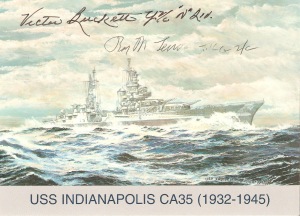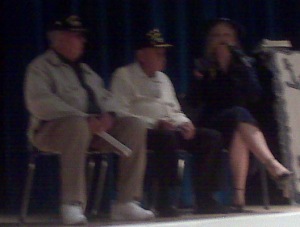
Commemorative card signed by survivor Victor Buckett and rescuer Roy McLendon. 25MAR2009
Last night I had the good fortune of attending a presentation by the USS Indianapolis Still at Sea program in Coral Park Senior High School – Miami, Florida.
The program tells the incredible and tragic story of the USS Indianapolis, which was torpedoed by a Japanese submarine in the Philippine Sea and sank in 12 minutes on July 30, 1945. Of the 1,196 sailors on board the cruiser, only 316 men were still alive after four days.
USS Indianapolis‘ sinking is considered to be the worst naval disaster in U.S. history.
I was deeply honored and moved to meet both Victor Buckett, one of the remaining survivors and Roy McLendon a rescuer who related their story of bravery and survival. The former, a gregarious octogenarian and the latter, a jovial septuagenarian.
There wasn’t a dry eye in the school auditorium after listening to Mr. Buckett and Mr. McLendon tell their firsthand accounts of the horrendous tragedy they faced as young seamen.
One of the many incidents told dealt with sailors becoming delirious and beginning to hallucinate thinking that nearby shipmates in open waters were Japanese, causing others experiencing the same hallucinations to kill off their fellow shipmates. Also, the unforgettable shrieking sounds as nearby shipmates were pulled underwater by sharks.

Photo of Mr. McLendon (l) and Mr. Buckett (r) during Q&A session taken with my mobile phone.
After the presentation during the Q & A session, Mr. Buckett told the story of assisting one of his shipmates who passed basic training without learning to swim. He held up his shipmate (unable to swim) as long as he could but lost him after three days. One of the audience questions asked what carried him through the perilous days. His response was he survived because of his belief in God, whom would see him through the ordeal and save him.
Mr. McLendon told his story of meeting the Captain of the USS Indianapolis Charles McVay after he was fished out of the water. McVay was unjustly accused of causing the sinking of the cruiser because he did not zigzag to avoid Japanese torpedoes. He later faced a court-martial and was only U.S. sea captain to be blamed by authorities for a disaster beyond his control.
Fortunately, a positive step to clear Captain McVay’s name was taken in October, 2000 when legislation was passed expressing the sense of Congress that his “military record should now reflect that he is exonerated” for the loss of the USS Indianapolis.
Although the first organized effort by survivors to clear Captain McVay’s name did not commence until 1960 when the Survivors Organization was formally established, it was never able to gain sufficient public attention until 1996 when an eleven-year-old boy, Hunter Scott, from Pensacola, Florida (who is now a Naval officer), saw the movie “Jaws” and was moved by the very accurate depiction of the character Quint portrayed by the late actor Robert Shaw who explained his hatred of the sharks by telling his story of surviving the attack upon the Indianapolis.
The remarkable care given to the survivors of the USS Indianapolis by their rescuers was also part of Mr. McLendon’s illustration of events he experienced as a young sailor. Sailors who were unable to stand up themselves in showers because of exhaustion after days in the water were held up by shipmate rescuers and the clumps of oil from their bodies were washed off. These same rescuers gave up their racks so survivors could sleep and rest.
Mr. Buckett and Mr. McLendon’s heart wrenching testaments are examples of human courage in the most extremes during wartime and of the U.S. Navy’s ethos of Honor, Courage and Commitment.
20090617 at 0805
Thank you for your comments. I, along with Michael Morrison, arranged the presentation at Miami Coral Park. I taught there 32 years and it was an honor for me to bring the program to the students in the afternoon and then again to the general public that evening. The students and others who attended the program were in awe of the stories Vic and Roy told about their ordeal. I can assure you that those present will nver forget the tragedy of the USS Indianapolis. I keep in touch with both Vic and Roy and hope to attend the rescuers annual reunion in September.
Again, thank you for the comments and I am very glad you were able to witness living history.
Doug Wycoff
20090617 at 0916
I appeared in two of these presentations at Blue Ridge Community College, Virginia. There were two other Survivors with me together with two of the rescue crew. Thin is one of the best means of presenting the USS Indianapolis story, and before we survivors are all gone.
Ed Harrell USMC
Survivor USS Indianapolis
20090617 at 1307
It was a great honor to have been a small part of helping to put this presentation on with Doug Wycoff. These presentations are so very much important to the education of young people. I do keep in touch with Mr. Buckett, and Mr. McLendon. I now have the great pleasure of calling both of them not only my Friends but also my Hero’s.
Michael Morrison
Miami, Fla.
20091110 at 0530
I am the speaker who gives this presentation with the survivors and rescuers of the USS Indianapolis. I can’t tell you what an honor it is to be allowed to tell their story. I can’t make it through the program without crying, no matter how many times I do it. These men really are heroes and they have changed my life. I love them all.
Thank you, Doug and Mike, for bringing us to Miami. It was phenomenal.
And Mr. Harrell- I LOVE doing the program with you as the guest of honor. You have such a sweet personality and your story is inspiring.
Sincerely, Kim Nielsen
20091111 at 1813
Excellent program. Have seen and attended several, and I totally agree with Mr. Ed Harrell, USS Indianapolis Survivor, that this is by far one of the best means of presenting this little-known but important part of WWII history. They delivered the bomb to the Enola Gay, then were left alone in the South Pacific, nobody aware they were missing for days. That any men survived is a testiment to their strength and will to live. They are my heroes.
If you might be interested in hosting such a presentation, go to the http://www.ussindianapolis.org website and in the forum section, see Educational Programs. Ms Kim Neilsen makes all this happen…her emotional piercing and historically accurate program, plus the Q&A by Survivors and/or Rescuers, makes this a once-in-a-lifetime experience that will affect the way you look at the Navy, these men, and all veterans differently for the rest of your life. It will also make you wonder if you have what these men had inside them. Their unofficial motto has to be, “Never Give Up”.
Two great men, Mr. Buckett and Mr. McLendon…and one great young lady, Ms Neilsen…how can you not be touched. This story is real. The emotions are real. Kudos to all who put this program in motion for the young people of the Miami area.
(I am the son of USS Indianapolis Survivor James Belcher, S1 Radioman. Dad went on to serve in Korea & Vietnam, and retired as a Chief Petty Officer in July 1969. He died May 3, 2001).
20111014 at 2038
I got up and left the presentation at BRCC on 10/14/11 because “Kim Nielsen” wouldn’t shut her trap and get off stage. I didn’t come to see her prance around in her stupid period costume. I came to hear the extraordinary experiences of men who had survived against harsh odds. Whatever organization does these events needs to kick her “look at me” act to the curb and let the real history speak through the REAL MEN who lived it.
20111207 at 1611
I’m sorry you feel that way, and even more sorry you have no clue what it takes to present this story to an audience many of whom do not know the factual background that sets up an understanding of what these men have to say. Kim graciously and knowledgeably tells the history first. To expect these men, 85 plus years old, to tell the background story themselves for the 10,000th time,is both cruel and selfish. So, you got up and left after: 1) you saw the men enter as introduced, 2) the missing man tribute to the 880 men who did not come home, 3) the posting of the colors by Fishburne Military School, 4) and heard the National Anthem sung… 5) then, Kim tells the background story to set up the men themselves speaking. All of this occurs within the 1st hour of a 2 1/2 hour program (just to keep it in perspective).. This presentation has received overwhelming compliments and praises over the past 6 years, in 6 states that I am aware of. Everyone including Ms Nielsen does this at no charge, as a volunteer, for the love of these men with the sole purpose of telling their story. What have you done lately? Glad to know you could do it so much better…but haven’t done it at all. Sorry everyone, but it rips me when someone cannot constructively communicate their criticisms, but instead chooses to misrepresent what they didn’t see. Next time stay and give us respectful feedback, or leave but mention what all you saw.